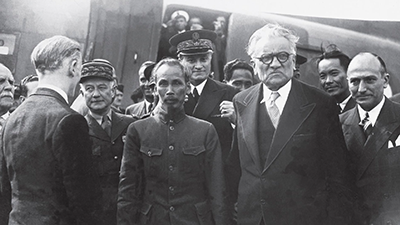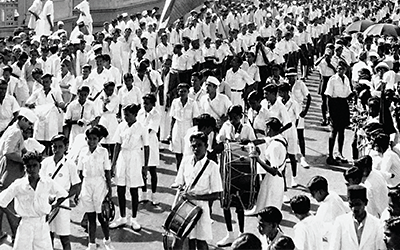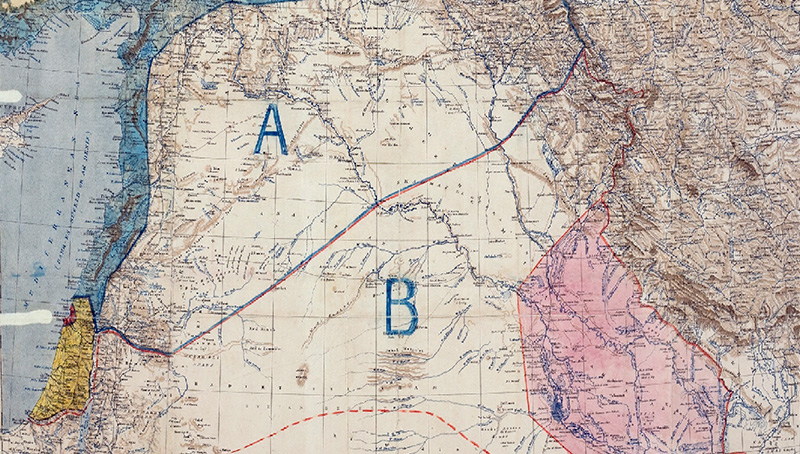Newly Independent States
Teacher Resources
Driving Question: How did newly independent states respond to post-colonial life?
Big empires rise and fall, pushed and pulled by what's happening inside and outside their borders. Leaders of newly-independent countries faced a variety of problems and used different tools to keep things in order, but their goals, methods, and overall success varied depending on various socio-political and cultural factors.
Learning Objectives
- Explain how political changes in the period from c. 1900 led to territorial, demographic, and nationalist developments.
- Use close reading skills to analyze the effects of decolonization on newly liberated regions.
Vocab Terms:
- decolonization
- ideological
- pan-nationalism
- subjugation
- Zionism
Opener: Newly Independent States
To teach this lesson step, refer to page 3 of the Lesson 8.6 Teaching Guide.
Revisit the Question Parsing Tool to help figure out what prompts are asking you to do.
End of Old Regimes
To teach this lesson step, refer to page 3 of the Lesson 8.6 Teaching Guide.
Why did so many great empires lose their colonies after the Second World War? This article gives you a global view of the post-war transformation that brought together all of the different regional stories you have encountered and will encounter in this unit.
-
Guiding Questions
-
Before you read
Preview the questions below, and then skim the article. Be sure to look at the section headings and any images.
While you read
Look for answers to these questions:
- This article makes a distinction between “decolonization” and the end of empires. What is that distinction?
- How did the Second World War contribute to the end of empires?
- What were some post-war global transformations that helped lead to the end of empires?
- What was the main instrument of those seeking independence within each colony, and why was it so useful?
After you read
Respond to the following questions:
- To what extent does this article explain how political changes in the period from c. 1900 to the present led to territorial, demographic, and nationalist developments?
- In this course, we generally use the term “decolonization” to mean the end of empire. But this author argues that decolonization should properly refer to the ending of all of the legacies of colonialism. What’s the difference? Do you agree with this author? Can you think of any “colonial legacies” that you have encountered in the world?
Political Decolonization, c. 1945–1997
To teach this lesson step, refer to page 5 of the Lesson 8.6 Teaching Guide.
Between 1945 and 1997, an unprecedented number of former colonies became independent. Explore this worldwide movement—from India and the Middle East to Africa.
-
Guiding Questions
-
Before you read
Preview the questions below, and then skim the article. Be sure to look at the section headings and any images.
While you read
Look for answers to these questions:
- How did the Second World War help some colonies achieve independence? Provide evidence and examples from the article.
- Why were multiple states created in the Indian subcontinent and the Middle East at this time?
- How did the Vietnamese independence movement inspire anti-colonial resistance in Algeria?
- Who was Kwame Nkrumah?
- Why was 1960 known as the “year of Africa”?
- Why were decolonization efforts in eastern and southern Africa more prolonged? Provide evidence and examples from the article.
After you read
Respond to the following question: The article ends with a statement about how other kinds of “decolonization” might be still to come. What are some ways that “decolonization” efforts might continue to take place in the future?
Decolonization and the Cold War
You’ve seen the many ways that the Cold War and decolonization were entangled. Use this activity to start pulling the threads apart.
Benazir Bhutto
To teach this lesson step, refer to page 6 of the Lesson 8.6 Teaching Guide.
Visit the Community Forum to see how other educators approach teaching with video.
Benazir Bhutto was the first woman to lead a Muslim-majority country. But her time as Pakistan’s Prime Minister was controversial. Was she an icon of progress for women’s rights? Or is her legacy tarnished by corruption and misrule?
-
Guiding Questions
-
Before you watch
Preview the questions below, and then review the transcript.
While you watch
Look for answers to these questions:
- Who was Benazir Bhutto’s father?
- What was the result of Benazir Bhutto’s first term in office?
- What did Benazir Bhutto focus on during her second term in office? Did she succeed?
- Why did Benazir Bhutto return to Pakistan and what was the result?
After you watch
Respond to the following question: Was Bhutto an effective leader and proponent of women’s rights? Or was she ineffective and corrupt? What additional types of evidence would help you support your claim?
Key Ideas
Source Collection: Newly Independent States
To teach this lesson step, refer to page 7 of the Lesson 8.6 Teaching Guide.
Check out the Sourcing One-Pager for a quick review of teaching sourcing.
Sociopolitical changes help fuel various independence movements around the world. In this exercise, you will use primary sources to find out what those changes are. We recommend you use the Quick-Sourcing Tool to complete this exercise.
Closer: Newly Independent States
To teach this lesson step, refer to page 8 of the Lesson 8.6 Teaching Guide.
Find evidence of how nationalism was used in decolonization movements.





